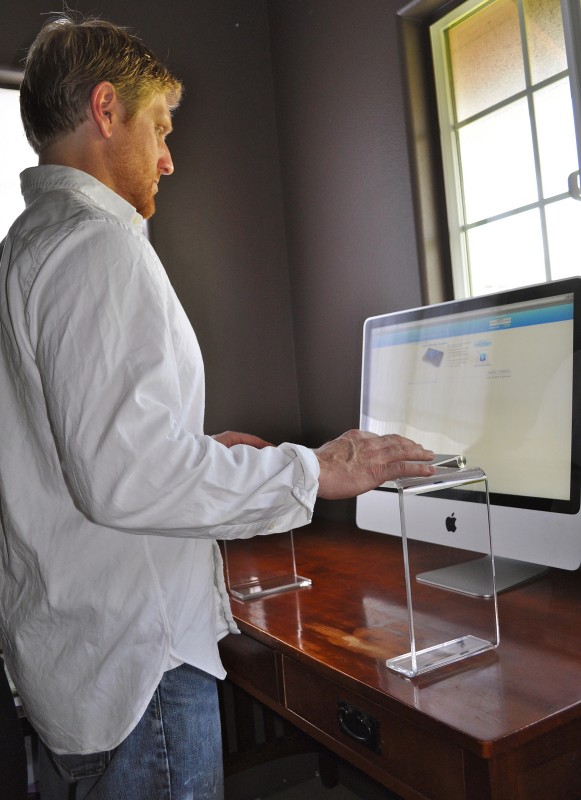By Helen Figueira
July 9, 2014
Time to read: 4 minutes
 Pilot study reveals the health benefits of standing up versus sitting down
Pilot study reveals the health benefits of standing up versus sitting down
In a study published in BMJ Open, Professor Jimmy Bell from the MRC Clinical Sciences Centre’s Metabolic and Molecular Imaging Group in collaboration with Dr Lee Smith from the Epidemiology and Public Health department, University College London, applied whole body magnetic resonance imaging (MRI) together with a postural allocation technique (an accelerometer and inclinometer attached to the participant’s thigh) to reveal the health benefits of simply standing up more. This is the first study to link objectively measured standing and sitting levels to how fat is distributed in the body.
Sedentary lifestyles are rapidly becoming the norm in Western society, with most people spending over 2/3 of their waking hours inactive: on computers, driving cars and watching television. Dubbed by experts “the new smoking”, sitting has been associated with a higher risk of cardiovascular diseases, as well as greater incidences of bowel, womb and lung cancers. Increasing exercise levels offers one solution, though maintaining any drastic changes to lifestyle has proven to be challenging, intensifying the need for more subtle yet lasting solutions.
Adjustable stand-up-sit-down desks, implemented in many offices throughout Scandinavia, promise to offset the health risks of sitting through targeting an environment, where for most, the majority of time is spent sedentary. To investigate the health benefits of such endeavours in more detail, Jimmy Bell and his team scanned a dozen healthy female volunteers for their body fat composition. MRI was used to calculate fat from the whole body, the liver and the abdominal area. The team then fitted the postural allocation device to the volunteers and monitored their ‘free-living’ activity, classifying activity levels into periods spent sitting, standing and walking. They noted that those who spent more time sitting had a higher fat content; in particular, their liver fat was almost double, which is one of the independent risk factors for insulin resistance and type II diabetes.
This new finding demonstrates that introducing very small changes in lifestyle is sufficient to make significant impact to human health. “It was recently estimated that simply replacing sitting for standing on weekdays could burn the equivalent calories as running several marathons a year,” says Louise Thomas, co-author on the paper. This was a pilot study on a small cohort of people. The next step for the group is to conduct a larger scale study to investigate the finding in more detail and address further health issues. “We want to know the number of standing hours sufficient per day to reap fat distribution rewards and to determine just how quickly after switching to standing desks one can expect to gain such health benefits,” explains Jimmy.
YJ
Reference: Smith, L., Thomas, E. L., Bell, J. D., & Hamer, M. (2014). The association between objectively measured sitting and standing with body composition: a pilot study using MRI. BMJ Open, 4 (6).
The Medical Research Council has been at the forefront of scientific discovery to improve human health. Founded in 1913 to tackle tuberculosis, the MRC now invests taxpayers’ money in some of the best medical research in the world across every area of health. Twenty-nine MRC-funded researchers have won Nobel prizes in a wide range of disciplines, and MRC scientists have been behind such diverse discoveries as vitamins, the structure of DNA and the link between smoking and cancer, as well as achievements such as pioneering the use of randomised controlled trials, the invention of MRI scanning, and the development of a group of antibodies used in the making of some of the most successful drugs ever developed. Today, MRC-funded scientists tackle some of the greatest health problems facing humanity in the 21st century, from the rising tide of chronic diseases associated with ageing to the threats posed by rapidly mutating micro-organisms. www.mrc.ac.uk